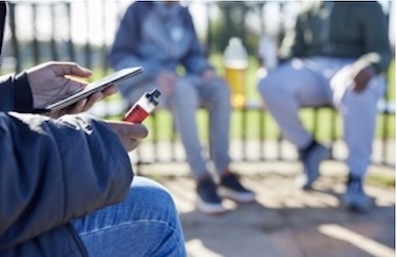 Cleanzine: your weekly cleaning and hygiene industry newsletter 26th June 2025 Issue no. 1168
Cleanzine: your weekly cleaning and hygiene industry newsletter 26th June 2025 Issue no. 1168
Your industry news - first
The original and best - for over 20 years!
We strongly recommend viewing Cleanzine full size in your web browser. Click our masthead above to visit our website version.
Environment and children's health to benefit from ban on disposable vapes and tobacco products
 As part of the Government's response to its recent consultation on smoking and vaping, disposable vapes and tobacco products are to be banned from sale in the UK to anyone born on or after 1st January 2009. The announcement this week of the ban has gone down well with many of those in our industry who have to deal with the collection and disposal of the discarded vapes themselves.
As part of the Government's response to its recent consultation on smoking and vaping, disposable vapes and tobacco products are to be banned from sale in the UK to anyone born on or after 1st January 2009. The announcement this week of the ban has gone down well with many of those in our industry who have to deal with the collection and disposal of the discarded vapes themselves.
Allison Ogden-Newton OBE, chief executive of environmental charity Keep Britain Tidy, for example:
"The announcement of a ban on disposable vapes is great news for the environment. Our surveys show that disposable vape litter has doubled in the past two years alone and last year more than 16% of the sites we surveyed were blighted by these single-use items, posing a significant risk to wildlife and polluting our streets, parks and beaches. An estimated 260 million are thrown away in this country every year, wasting precious scarce resources, including lithium."
Cllr David Fothergill, Chairman of the Local Government Association's Community Wellbeing Board says that the Board is delighted that the Government has listened to the longstanding concerns of the LGA and that councils and are taking decisive action to ban single-use vapes.
"Disposable vapes are inherently unsustainable products, meaning an outright ban remains the most effective solution to this problem," he says. "Single use vapes blight our streets as litter, are a hazard in our bin lorries, and are expensive and difficult to deal with in our recycling centres. We look forward to working with the Government and others to enforce this ban as well as ensure plans for a Smokefree generation are a success."
Libby Peake, Head of Resource Policy, Green Alliance, says: "This ban can't come soon enough, not only for the health of future generations, but also for the health of the planet. The Government has followed the science, and this decision will have many environmental benefits. Valuable lithium ion batteries will stop going to waste or winding up as litter, along with all the casings that have been blighting our environment for too long. This means critical raw materials will be preserved for uses where they're much needed - like renewable energy. The risk of fire from mishandled batteries will be minimised and dangerous plastic pollution will be prevented. This bold move by the Government is nothing but good news."
Environment Secretary Steve Barclay is, naturally, delighted about the ban, saying:
"Not only are disposable vapes often targeted, unacceptably, at children - they also represent a huge and growing stream of hard-to-recycle waste, with nearly five million thrown away every week. This historic announcement will be a powerful tool in support of our efforts to crack down on waste and boost recycling, as well as helping to create the first smokefree generation."
Gavin Graveson, senior executive vice president, Northern Europe, Veolia, ( www.veolia.co.uk ) says:
"When faced with an environmental crisis, every product that enters the market should be designed for recyclability. Disposable vapes are a clear example of when products have been designed with no thought for their environmental impact and should be subject to an extended producer responsibility scheme that incentivises the right eco-design.
"Millions of disposable vapes have been littered causing environmental damage or thrown in bins where they cause weekly fires in recycling and waste trucks as well as treatment facilities.
"We can't afford to allow more pollution. Veolia's recycling scheme has already recycled over one million vapes and we support policies that will curb products with no end of life treatment."
Recent figures show that the number of children using vapes in the past three years has tripled. Use among younger children is also rising, with 9% of 11 to 15-year-olds now using vapes. The long-term health impacts of vaping are unknown and the nicotine contained within them can be highly addictive, with withdrawal sometimes causing anxiety, trouble concentrating and headaches. While vaping can play a role in helping adult smokers to quit, children should never vape.
Disposable vapes have been a key driver behind the alarming rise in youth vaping, with the proportion of 11 to 17-year-old vapers using disposables - increasing almost nine times in the last two years.
1st February 2024







